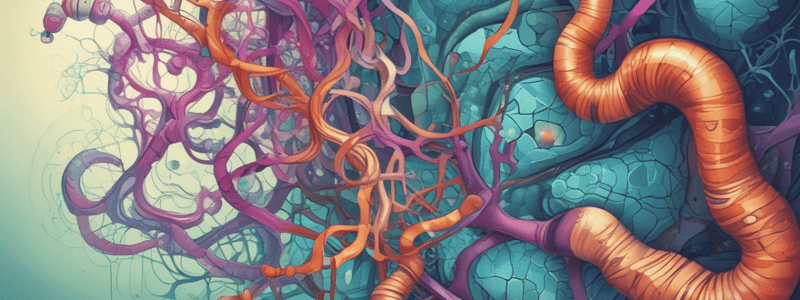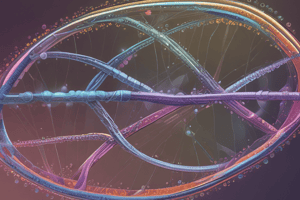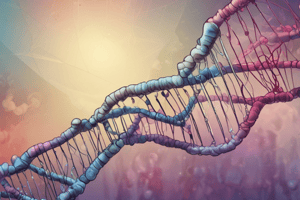Podcast
Questions and Answers
What is the term for a group of organisms that can reproduce to produce fertile offspring?
What is the term for a group of organisms that can reproduce to produce fertile offspring?
- Species (correct)
- Population
- Allele Frequency
- Gene Pool
What is the term for an alternative form of a gene?
What is the term for an alternative form of a gene?
- Allele (correct)
- Phenotype
- Allele Frequency
- Gene Pool
What type of mutation occurs in somatic cells and affects only the individual in which the mutation occurred?
What type of mutation occurs in somatic cells and affects only the individual in which the mutation occurred?
- Chromosomal mutation
- Genetic drift
- Somatic mutation (correct)
- Germ-line mutation
What is the measure of how common an allele is in a population?
What is the measure of how common an allele is in a population?
What is the result of genetic variation in a population?
What is the result of genetic variation in a population?
What is the term for the total collection of alleles in a population?
What is the term for the total collection of alleles in a population?
What is the process by which individuals with certain traits are more likely to survive and reproduce?
What is the process by which individuals with certain traits are more likely to survive and reproduce?
What is the term for the presence of an extra copy of a chromosome?
What is the term for the presence of an extra copy of a chromosome?
Which of the following is an example of aneuploidy?
Which of the following is an example of aneuploidy?
What is the result of a point mutation?
What is the result of a point mutation?
What is the term for a mutation that results in a different amino acid being substituted?
What is the term for a mutation that results in a different amino acid being substituted?
What is the total number of chromosomes in a diploid cell?
What is the total number of chromosomes in a diploid cell?
What is the result of a frameshift mutation?
What is the result of a frameshift mutation?
Which of the following is a type of gene mutation?
Which of the following is a type of gene mutation?
What is the cumulative effect of the process of recombination and mutation?
What is the cumulative effect of the process of recombination and mutation?
What is the primary mechanism by which mutations occur?
What is the primary mechanism by which mutations occur?
What is the term for a change in the nucleotide sequence of DNA?
What is the term for a change in the nucleotide sequence of DNA?
What is the result of nondisjunction during meiosis?
What is the result of nondisjunction during meiosis?
What is the term for a chromosomal mutation in which a part of the chromosome is lost?
What is the term for a chromosomal mutation in which a part of the chromosome is lost?
What is the result of a translocation?
What is the result of a translocation?
What is the effect of most mutations on an organism?
What is the effect of most mutations on an organism?
What type of mutation results in a stop codon and a shorter polypeptide?
What type of mutation results in a stop codon and a shorter polypeptide?
What is the term for the phenomenon where a gene is expressed differently based on the parent of origin?
What is the term for the phenomenon where a gene is expressed differently based on the parent of origin?
What type of mutation results in an amino acid with similar chemical properties?
What type of mutation results in an amino acid with similar chemical properties?
What is the result of a frameshift mutation?
What is the result of a frameshift mutation?
What is the characteristic of genomic imprinting?
What is the characteristic of genomic imprinting?
What is the term for the inheritance pattern where a single allele is inherited from one parent?
What is the term for the inheritance pattern where a single allele is inherited from one parent?
What is the result of a silent mutation?
What is the result of a silent mutation?
What is the characteristic of non-mendelian inheritance?
What is the characteristic of non-mendelian inheritance?
What is the term for the type of mutation that occurs in mitochondrial DNA?
What is the term for the type of mutation that occurs in mitochondrial DNA?
Flashcards are hidden until you start studying
Study Notes
Definitions of Key Terms
- Species: Groups of organisms that can reproduce to produce fertile offspring.
- Population: A group of the same species living in an area with genetic variations among individuals.
- Allele: An alternative form of a gene, typically two alleles for a trait are inherited from each parent.
- Allele Frequency: A measure of how common an allele is in a population.
- Gene Pool: The total collection of alleles in a population.
Mutations
- Definition: Modifications, deletions, or additions of base pairs in DNA which can affect genetic information.
- Types of Mutations:
- Somatic Mutations: Occur in somatic cells; affects only the individual.
- Germ-line Mutations: Occur in gametes; can be passed to the next generation.
- Mutation Rate: Probability of a specific mutation occurring over time or generations.
- Mutation Frequency: Number of occurrences of a particular mutation within a population.
Genetic Variation
- Importance: Genetic diversity enhances survival chances of individuals within a population.
- Phenotype: Observable traits resulting from one or more genes; examples include body size and feather patterns, influencing natural selection.
Chromosomal Disorders
- Down Syndrome: Presence of an extra 21st chromosome (trisomy 21).
- Turner Syndrome: Individual has a single X chromosome (monosomy).
- Klinefelter Syndrome: Presence of an extra X chromosome (XXY).
Chromosomal Anomalies
- Trisomy: Presence of an extra chromosome (2n + 1).
- Monosomy: Absence of one chromosome (2n - 1).
- Haploid (n): 23 chromosomes (22 autosomal + 1 sex chromosome).
- Diploid (2n): 46 chromosomes (44 autosomal + 2 sex chromosomes).
Gene Mutations
- Definition: Changes in the nucleotide sequence of a gene; they can vary in size and impact.
- Types of Gene Mutations:
- Point Mutations: Change a single nucleotide through substitution, insertion, or deletion.
- Frameshift Mutations: Insertions or deletions that alter the reading frame of the gene.
- Missense Mutation: Substitutes one amino acid for another.
- Nonsense Mutation: Substitutes for a stop codon, leading to a shorter polypeptide.
- Silent Mutation: Does not change the amino acid.
Chromosomal Mutations
- Types:
- Deletion: Loss of a chromosome segment.
- Inversion: A chromosome segment breaks and reinserts in reverse order.
- Duplication: Repetition of a chromosome segment.
- Translocation: A segment of one chromosome attaches to a non-homologous chromosome.
- Nondisjunction: Failure of chromosomes to separate properly, leading to abnormal gametes.
Non-Mendelian Inheritance
- Genomic Imprinting: Epigenetic marking causes monoallelic expression depending on the parent.
- Uni-Parental Disomy: Inheritance of two copies of a chromosome from one parent.
- Mitochondrial Inheritance: Genes are inherited through the maternal lineage.
- Dynamic Mutation: Mutations that can change in frequency and expression across generations.
Studying That Suits You
Use AI to generate personalized quizzes and flashcards to suit your learning preferences.




